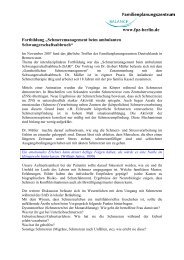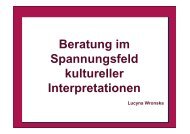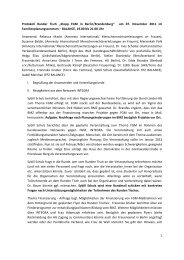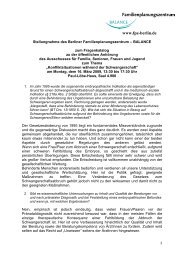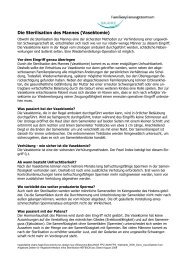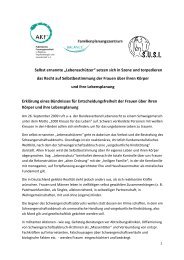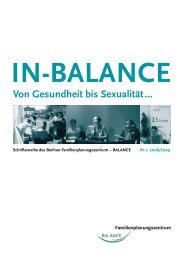Listening to African Voices - FPZ
Listening to African Voices - FPZ
Listening to African Voices - FPZ
You also want an ePaper? Increase the reach of your titles
YUMPU automatically turns print PDFs into web optimized ePapers that Google loves.
“Female circumcision is and will remain a good thing forwomen. This is another reason why I should leave thiscountry as quickly as possible.” (man of Burkinabe origin)About 30% of the participants do not see any benefit inFGM/C and spoke in favour of its abolition.“I am <strong>to</strong>tally against the practice. There are no positiveoutcomes. The practitioners are <strong>to</strong> be blamed.” (man ofBurkinabe origin)“This practice is not good; and it would be a good thing<strong>to</strong> see it s<strong>to</strong>p. It would be good <strong>to</strong> give practitioners analternative.” (man of Burkinabe origin)5.5.10.5. FGM/C and religionAmong the interviewed Muslims (57 persons), 15 men and 1women believed that FGM/C was a practice associated withIslam. None of the Christians interviewed saw a link betweenFGM/C and their religion.5.5.10.6. Perception of disadvantages and knowledge ofrisks and consequencesOver 70% of the interviewees had a certain degree ofawareness of the harm of FGM/C and could specify at leas<strong>to</strong>ne negative outcome of the practice. The most commonlycited hazards were difficulties during childbirth and sexualdisorders for the women.5.5.10.7. Knowledge of German law and attitudes <strong>to</strong>wardsthe abandonment of FGM/CMore than half of the interviewed Burkinabe (39 of 75 participants)are aware that the German law prosecutes FGM/C.Another significant proportion (25 participants) expresseduncertainty about the position taken by the German legalsystem on the subject. A few participants (four men) assertedthat FGM/C is not specifically mentioned in German law.The impact of FGM/C being punishable by law in Germanyhas a strong dissuasive effect on parents in favour of FGM/C.“A woman who is not circumcised has no respect for otherpeople, she is impertinent, frivolous and can’t controlherself when approached by men. Nevertheless, for mydaughters, I had <strong>to</strong> decide against the practice. They areborn here and the Germans don’t joke with their laws.”(man of Burkinabe origin, father of three daughters)Regarding the abandonment of FGM/C, the greater par<strong>to</strong>f the participants confirmed their wish <strong>to</strong> see the practiceabolished. There were, however, eight men advocating forthe continuation of the practice and 12 participants whowere undecided regarding the continuation of FGM/C.Worried about the sexual behaviour of the young girls, somepeople prefer <strong>to</strong> consider modifying the way the practice isdone than abolishing it.“If the practice is dangerous, then I suggest <strong>to</strong> medicaliseit, <strong>to</strong> hand it over <strong>to</strong> health professionals so it can becarried out in good conditions and at the same time, we’llhave fewer girls on the streets.” (man of Burkinabe origin)5.5.11. Guinea5.5.11.1. Socio-demographic profileThere are 178 registered immigrants of Guinean originin Hamburg with more than twice as many men (122) aswomen (56). With two Guinean researchers in the team,we managed <strong>to</strong> reach a significant number: 77 men and38 women. We excluded one man from the data analysisfor whom the researcher noted that “he looks <strong>to</strong>o afraid <strong>to</strong>answer and rejects all questions.” With one participant fewer,the <strong>to</strong>tal sample added up <strong>to</strong> 114 persons.Most of the interviewed participants were either housewives,job seekers or employed in low-wage work. The level ofeducation was low relative <strong>to</strong> the other countries. All interviewedparticipants of Guinean origin were Muslims. Theresearchers saw themselves often confronted with <strong>to</strong>tal lackof interest, reticence or harsh reactions <strong>to</strong> the research <strong>to</strong>pic,in particular from men.“I believe that you [speaking <strong>to</strong> the researcher] shouldget busy with something different because that issue is ofno importance. The residence status is what counts andthe Germans should give it <strong>to</strong> us. This is important andnot female circumcision or the <strong>African</strong> culture in Germany.”(man of Guinean origin)“My problems are my papers and not this stupid set ofquestions that you are asking.” (man of Guinean origin)5.5.11.2. Proportion of immigrant population concernedGuinea has one of the highest FGM/C prevalence ratesin Africa. According <strong>to</strong> the last DHS, 96% of the Guineanfemale population have undergone FGM/C. The prevalencefor the cohort of daughters is barely lower at 94%. FGM/Cis practiced across all ethnic groups and is almost universal(99%) in the biggest ethnic groups, the Soussou, Malinkeand Fula. The only ethnic group with a lower prevalence rate(68%) are the Guerze of the Forest region (DNS Guinea &ORC Macro 2006).70<strong>Listening</strong> <strong>to</strong> <strong>African</strong> <strong>Voices</strong>






